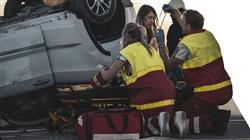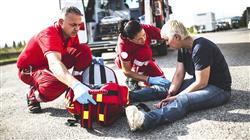University certificate
The world's largest faculty of psychology”
Introduction to the Program
Through a thorough knowledge of the different specific situations that can occur in a crisis context, you will learn the most effective and efficient psychotherapeutic strategies for each case"

One of the most important characteristics that a psychology specialist must possess is the ability to adapt to the different contexts he/she must face in the exercise of his/her professional practice. Working with an adult is not the same as working with a child, just as the psychotherapeutic treatment of bereavement is not the same as working with a victim of gender violence. Based on this, professionals in this sector must know in detail the action protocols for the different specific situations that may arise in the context of a crisis or emergency.
Thanks to the exhaustive management of the most innovative and effective protocols for each case, it increases the possibilities of achieving a more successful and satisfactory approach to the patient's mental health. For that reason, the course of this program designed by TECH is the best educational option to work on it through 300 hours of intensive, dynamic and multidisciplinary training. This is a qualification designed by experts in crisis psychology that includes the latest clinical advances in the intervention in situations of acute stress, anxiety and panic caused by: sudden deaths, sexual aggressions, disappearances, suicide attempts, violent patients, people under the effect of alcohol and/or drugs, etc.
It is, therefore, a 100% online educational option, versatile, intensive and flexible, perfect for perfecting your professional competencies in the psychotherapeutic management of victims and their environment. All this through diverse material that includes, in addition to the syllabus, real clinical cases and hours of additional varied content presented in different formats. Thus, graduates will be able to contextualize the information and deepen in a personalized way the aspects of the syllabus that they consider most important for their professional performance.
Would you like to perfect your communication skills for delivering bad news? With this course you will delve into the most effective tactics for this"
This Postgraduate Diploma in Protocols for Advanced Specific Situations contains the most complete and up-to-date program on the market. The most important features include:
- The development of case studies presented by experts in Psychology and Emergency Services and Emergency Services
- The graphic, schematic, and practical contents with which they are created, provide scientific and practical information on the disciplines that are essential for professional practice
- Practical exercises where the self-assessment process can be carried out to improve learning
- Its special emphasis on innovative methodologies
- Theoretical lessons, questions to the expert, debate forums on controversial topics, and individual reflection assignments
- Content that is accessible from any fixed or portable device with an Internet connection
A program designed, among other things, so that you can implement the most effective emotional support strategies in your professional practice when a sudden loss occurs"
The program’s teaching staff includes professionals from the sector who contribute their work experience to this educational program, as well as renowned specialists from leading societies and prestigious universities.
Its multimedia content, developed with the latest educational technology, will allow professionals to learn in a contextual and situated learning environment, i.e., a simulated environment that will provide immersive education programmed to prepare in real situations.
The design of this program focuses on Problem-Based Learning, through which professionals must try to solve the different situations of professional practice that are presented to them throughout the educational course. For this purpose, they will be assisted by an innovative system of interactive videos produced by renowned experts.
You will have additional high-quality material to delve into aspects of the syllabus such as coping techniques for traumatic events"

You will work on the aspects to take into account when dealing with an aggressive patient and to manage the out-of-hospital suicidal patient"
Syllabus
TECH is a pioneer in the use of the Relearning methodology for the development of the theoretical content of its degrees. of the theoretical content of its qualifications. This pedagogical strategy consists of the reiteration of the most relevant concepts throughout the syllabus, fostering a natural and progressive learning process and reducing the number of hours that graduates natural and progressive learning and reducing the number of hours that graduates must spend on their specialization. It also includes hours of high-quality additional material that will help you contextualize the information and delve in a personalized and dynamic way in the different sections of this postgraduate certificate.

You will be able to access the Virtual Campus without schedules or limits, as well as from any device with internet connection, whether it is a PC, tablet or mobile phone”
Module 1. Action Protocols for Specific Situations I
1.1. Intervention in Acute Stress, Anxiety and Panic
1.1.1. Introduction to the Concept of Acute Stress, Anxiety and Panic
1.1.2. Acute stress Intervention Process
1.1.3. Anxiety Intervention Process
1.1.4. Panic Intervention Process
1.2. Grief
1.2.1. Concept of Grief
1.2.2. Theories on Grief
1.2.3. Manifestations of Normal Grief
1.3. Introduction and Types of Grief
1.3.1. Stages of Grief
1.3.2. Types of Grief
1.3.3. Functions of Grief
1.4. Grief Crisis Intervention
1.4.1. Importance of Intervention in Grief
1.4.2. Grief Crisis Intervention Process
1.5. Delivering Bad News I
1.5.1. Announcing Bad News
1.5.2. Procedure for Communicating Bad News
1.5.3. Stages of a Person Receiving Bad News
1.6. Delivering Bad News II
1.6.1. Professional Skills in the Delivery of Bad News
1.6.2. Factors that Affect the Delivery of Bad News
1.6.3. Specific Considerations for Communicating Bad News to Children and Other Groups
1.7. Emotional Support in the Event of Loss
1.7.1. Emotional Support
1.7.2. Loss
1.7.3. Emotional Support as a Influencing Factor in Crisis Situations
1.8. Intervention with Aggressive Patients
1.8.1. Aggressive Patient Characteristics
1.8.2. Keys Points for Intervention for Patients with Aggressive Behaviors
1.8.3. Therapist Skills for Dominating the Therapeutic Scenario for Patients with Aggressive Behaviors
1.8.4. Intervention Techniques with Aggressive Patients
1.9. Intervention and Management of the Suicidal Outpatient
1.9.1. Suicide
1.9.2. Therapeutic skills for the Management of the Suicidal Outpatient
1.9.3. Intervention with Patients at Risk of Suicide
1.10. Intervention with Family Members of Missing Persons
1.10.1. Factors to Take into Account in the Management of Missing Persons Family Members
1.10.2. Techniques for Coping with Traumatic Events
1.10.3. Intervention Process
Module 2. Action Protocols for Specific Situations II
2.1. Intervention with Victims of Gender Violence
2.1.1. Introduction to Domestic Violence
2.1.2. Principles of Intervention with Patients Victims of Gender Violence
2.1.3. Skills and Knowledge for Targeted Intervention
2.1.4. Intervention Procedure
2.2. Intervention with Victims of Sexual Assault
2.2.1. Introduction to the Concept of Sexual Assault
2.2.2. Trauma in the Victims of Sexual Assault
2.2.3. Skills and Knowledge for Targeted Intervention
2.2.4. Procedures for Intervention with Victims of Sexual Assault
2.3. Intervention with People Intoxicated by Alcohol and Drugs
2.3.1. Drug Use
2.3.2. Drug Classification
2.3.3. Intervention with Consumers
2.4. Crisis Intervention with Children
2.4.1. The Therapeutic Process with Children
2.4.2. Key Considerations and Principles in Therapeutic Intervention with Infants
2.4.3. Effective tools for Intervention with Children
2.5. Crisis Intervention with the Psychiatric Patient
2.5.1. Introduction to the Concept of the Psychiatric Patient
2.5.2. The Role of the Psychologist in Crisis Intervention with a Psychiatric Patient
2.5.3. Keys Considerations and Principles of Effective Intervention
2.6. Crisis Intervention with the Elderly
2.6.1. Elderly People in the Psychologist's Office
2.6.2. Key Considerations and Principles for Crisis Intervention with Infants
2.7. Crisis Intervention with People with Intellectual Disabilities
2.7.1. Introduction to Intellectual Disability
2.7.2. Key Considerations and Principles for Crisis Intervention with Patients with ID
2.7.3. Tools for Interventions with People with ID
2.8. Crisis Intervention with Immigrants
2.8.1. Trauma and Stress for Immigrants
2.8.2. Key Considerations and Principles for Crisis Intervention with Immigrants
2.9. Accompaniment in the Identification of Corpses
2.9.1. Therapeutic Support
2.9.2. Accompaniment in the Identification of Corpses
2.9.3. Funeral and Burial Ceremony
2.10. Psychological Support for Technicians
2.10.1. Upon Completion of the Intervention
2.10.2. Preventing Fatigue
2.10.3. Shifts and Breaks
2.10.4. Coping Strategies

The best program in the educational market to promote your professional quality as a psychologist specialized in the therapeutic intervention of different crisis situations"
Postgraduate Certificate in Action Protocols in Advanced Specific Situations
At TECH Global University we have designed a course with the objective of providing psychology professionals with solid education in protocols and intervention techniques in advanced specific situations in order to improve the attention and care of patients. Combining theory and practice for the detection, assessment and intervention in situations of trauma, crisis, violence, maltreatment, stress and emotional exhaustion. Students will learn advanced tools and techniques for victim care, coordination with other professionals and social resources, and prevention of work stress and burnout. At the end of the program, students will be qualified to intervene in difficult and complex situations with solvency and effectiveness.
Protocols for Psychological Intervention in Crisis and Emergencies
This course will provide you with the theoretical and practical tools to become an expert when dealing with the different protocols of psychological intervention in crisis and emergency situations, such as natural disasters, accidents, violence, among others. You will learn techniques to address acute and severe mental health situations such as suicide attempts, psychotic disorders, eating disorders, among others, seeking to provide tools and strategies for psychology professionals. It also addresses the different protocols and techniques for intervention in situations of acute stress and post-traumatic stress disorder, trying to provide tools to address the symptoms and sequelae that occur in these patients, from clinical psychology.
Enroll in the world's largest online university and learn about the different protocols and techniques for intervention in situations of acute stress and post-traumatic stress disorder, trying to provide tools to address the symptoms and sequelae that occur in these patients, from clinical psychology.







